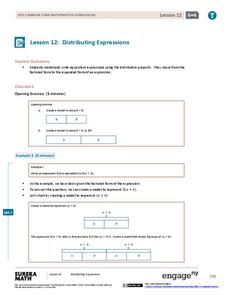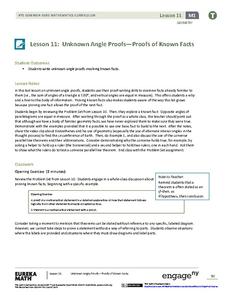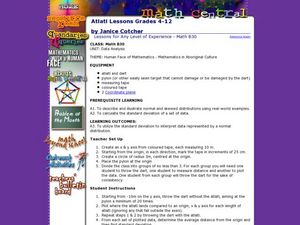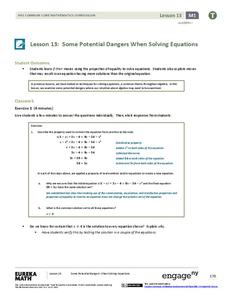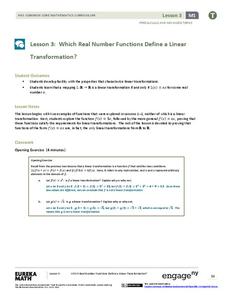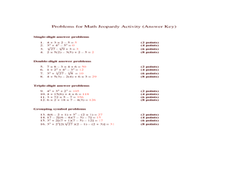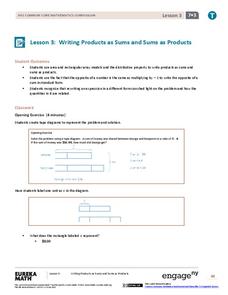EngageNY
Negative Exponents and the Laws of Exponents
Apply the properties of exponents to expressions with negative exponents. The fifth lesson in the series explains the meaning of negative exponents through an exploration of the properties taught in the previous lessons of the...
EngageNY
Special Lines in Triangles (part 1)
Allow your pupils to become the mathematicians! Individuals explore the properties of a midsegment of a triangle through construction and measurement. Once they figure out the properties, learners use them to draw conclusions.
EngageNY
Least Common Multiple and Greatest Common Factor
Find the common denominator between prime factors, factor trees, and the distributive property. Scholars learn to find the least common multiple and greatest common factor of pairs of numbers. They rotate through stations to connect...
EngageNY
Changing the Base
I can't calculate a base-2 logarithm since my calculator doesn't have a base-2 log key. Young mathematicians use the change of base formula to extend the properties of logarithms to all bases. Among these bases is the natural log base,...
EngageNY
Proofs of Laws of Exponents
Apply pupil understanding of exponent properties to prove the relationships. In the sixth lesson of the series, individuals are expected to prove relationships using mathematical statements and reasoning.
EngageNY
Distributing Expressions
You know how to factor expressions; now it's time to go the opposite way. Scholars learn to write algebraic expressions in expanded form using the distributive property. A problem set helps them practice the skill.
EngageNY
Matrix Addition Is Commutative
Explore properties of addition as they relate to matrices. Using graphical representations of vector matrices, scholars test the commutative and associative properties of addition. They determine if the properties are consistent for...
EngageNY
Unknown Angle Proofs—Proofs of Known Facts
Lead the class in a Greek history lesson plan with a geometric twist. Pupils relate a short video about geometric properties to modern-day methods of solving for unknown angles. They discuss parallel line theorems and...
Curated OER
Human Face of Mathematics - Mathematics in Aboriginal Culture
Students collect statistical data. In groups, students play a dart game and then determine the distance between darts. They collect the data and plot the information on a coordinate plane. They identify the mean and the...
Illustrative Mathematics
Writing Expressions
Practice writing algebraic expressions from written phrases. The objective is to consider two seemingly similar phrases, write them as algebraic expressions, and then simplify using the order of operations. Learners are challenged to...
Curated OER
Inductive and Deductive Reasoning
Students use logical arguments and inductive reasoning to make or disprove conjectures. After observing a teacher led demonstration, students discover that the deductive process narrows facts to a few possible conclusions. In groups,...
Curated OER
Domain: Operations and Algebraic Thinking
Practice basic operations for young mathematicians in fun ways! Using two decks of cards (Ace through 10 plus the joker), learners play "memory" by matching numbers that can be added to make 10 and writing number sentences. In another...
Curated OER
Got These Properties? (Commutative in Addition/Zero in Addition and Subtraction)
Second graders examine the commutative property of addition and the property of zero in addition and subtraction. They complete an asessment worksheet to gain practice reading and working number sentences horizontally and vertically.
Curated OER
Modeling Addition: Commutative Property and Zero Property
First graders practice modeling addition. In this hands-on addition lesson plan, 1st graders are introduced to the Commutative Property of Addition and the Zero Property of Addition through modeling and the use of manipulatives. This...
Curated OER
Pattern Search
Third graders review the commutative and associative property in mathematics. Using a worksheet, they work together to identify the patterns between the 32 triangles. To end the lesson plan, they create their own array and exchange it...
EngageNY
Some Potential Dangers When Solving Equations
Need a less abstract approach to introducing extraneous solutions? This is it! Young mathematicians explore properties used to solve equations and determine which operations maintain the same solutions. They...
EngageNY
Three-Dimensional Space
How do 2-D properties relate in 3-D? Lead the class in a discussion on how to draw and see relationships of lines and planes in three dimensions. The ability to see these relationships is critical to the further study of volume and...
EngageNY
Which Real Number Functions Define a Linear Transformation?
Not all linear functions are linear transformations, only those that go through the origin. The third lesson in the 32-part unit proves that linear transformations are of the form f(x) = ax. The lesson plan takes another look at examples...
EngageNY
Graphs of Linear Functions and Rate of Change
Discover an important property of linear functions. Learners use the slope formula to calculate the rates of change of linear functions. They find that linear functions have constant rates of change and use this property to determine if...
Curated OER
Solving Algebraic Equations: Algebra/Geometry Institute
Students solve problems using PEMDAS. In this algebraic equations instructional activity, students evaluate expressions using real number properties. They play "Math Jeopardy" to reinforce the order of operations.
Curated OER
Investigation - Who is Right?
Third graders investigate two mathematic scenarios and determine which is correct. They compare adding columns and places (such as the tens place, hundreds place, and so on) and familiarize themselves with how to add larger numbers.
EngageNY
Multiplying and Dividing Expressions with Radicals
That's radical! Simplifying radicals may not be exciting, but it is an important skill. A math lesson provides explanations of properties used throughout the material. Scholars practice skills needed to multiply and divide...
EngageNY
Writing Products as Sums and Sums as Products
Create rectangle and area models to help students understand expressions. The third installment in the 28-part series has pupils first represent expressions using rectangular array models. The exercises help scholars understand the...
Illustrative Mathematics
3-D Shape Sort
From the apple on your desk and the coffee cup in your hand, to the cabinets along the classroom wall, basic three-dimensional shapes are found everywhere in the world around us. Introduce young mathematicians to the these common figures...





